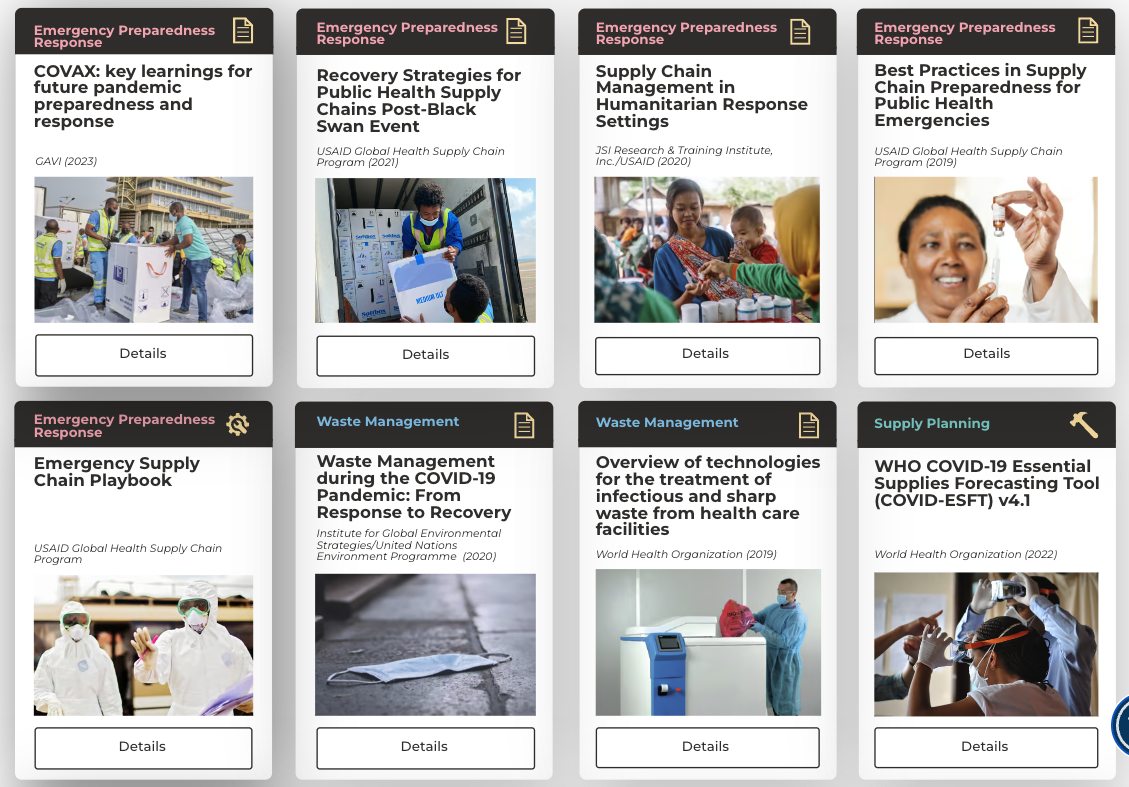Introducing Essential Resource Collection: Resilient Supply Chains during Public Health Emergencies
Introducing Essential Resource Collection: Resilient Supply Chains during Public Health Emergencies

Katelyn Morgan

Josh Rosenfeld

Emily Oster

Emma Stewart
Published on August 2, 2023

Knowledge SUCCESS and the USAID COVID Response Team are excited to co-curate a new collection of essential resources that support the establishment of resilient supply chains during public health emergencies.
The COVID-19 pandemic illustrated the importance of emergency preparedness and adaptive health supply chains. Responsive health supply chains are critical for ensuring readiness to provide personal protective equipment (PPE), medical and laboratory equipment, vaccines, and other necessary commodities to respond to future global health emergencies. At the start of the COVID-19 pandemic, all these commodities faced long production and shipping delays. This list is a collection of resources that resulted from the actions and collaborative responses taken to rapidly deploy needed supplies , but also establish emergency response plans, forecast and improve supply plans to assure consist access to commodities, track commodity supply and use, handle resulting wastes, manage challenging storage requirements,, and deliver commodities equitably.
A ”resilient” supply chain exists when its systems, institutions, and actors have the capacity to handle change and unexpected disturbances. There are a few conditions that make up a resilient supply chain:
- A supply chain must have an adaptive capacity to learn and adjust to changing internal and external factors.
- The supply chain must have transformative abilities that allow it to reorganize itself to facilitate an improved response to unknown emerging health threats.
- The supply chain must be informed by forethought and planning by leaders, donors, and implementers regarding its operating environment, past experiences, and potential innovation.
This Essential Resources Collection on Resilient Supply Chains highlights some of the key resources and lessons learned from the COVID-19 pandemic to address future public health emergencies. Resources are grouped into seven key technical and thematic areas:
- Emergency Response Preparedness
- Waste Management (including Reverse Logistics)
- Supply Planning
- Inventory Management and Distribution
- Cold Chain Storage and Distribution
- Procurement
- Optimization of Laboratory Networks for Disease Surveillance
This resource collection provides a broad range of resources that address varied considerations to create resilient health supply chains. This includes planning to ensure that commodities, personnel, and strategies are ready to respond to the initial phase of an emergency; supply planning and procurement for preparedness and emergency response; and ideas to appropriately manage and distribute health commodities in a timely and logistically sound manner. Additional resources discuss the optimization of laboratory networks to strengthen their disease surveillance performance and the design of reverse logistics and other activities to manage and limit large-scale waste resulting from public health emergencies. Finally, this essential resource collection also includes key tools to guide strategic planning and financing decisions for technical experts, governments, donor agencies, and implementers to mitigate supply chain risk.
We hope that these resources highlight the lessons learned from global, regional, and national supply chain responses to the COVID-19 pandemic, and underscore the need for further innovation to create resilient supply chains able to respond to future public health emergencies.
How We Chose the Resources
Knowledge SUCCESS and the USAID COVID Response Team curated this set of essential resource documents using the following criteria for selection:
- Recently published and applicable to current and future health emergencies
- Innovative thinking and implementation of supply chain management
- Consideration of diverse topics to cover the wide scope of health supply chain activities
- Activities and methods that are adaptable to different countries and health system settings
Several resources are artifacts of the COVID-19 pandemic response and shed light on how health supply chain lessons could be translated to prepare institutions and health systems to proactively address future public health emergencies.

Katelyn Morgan
Katelyn Morgan is a Supply Chain Vaccine Technical Advisor on USAID’s COVID-19 Response Team (CRT). Previously, Katelyn worked as a Supply Chain Advisor within USAID’s Office of HIV/AIDS, supporting the delivery of HIV/AIDS commodities and supply chain systems strengthening efforts in several countries, including Botswana, Eswatini, and Zambia. Katelyn has also contributed to HIV/AIDS commodity stock data visibility as a Supply Chain Analyst with a USAID implementing partner, aggregating and analyzing global product transitions. Katelyn previously trained NTD Program Managers on best supply chain management practices in Nigeria, Ethiopia and Ghana. Katelyn holds a Masters of Public Health from George Washington University and a Masters of Public Policy from Stony Brook University.

Josh Rosenfeld
Josh Rosenfeld is a Senior Vaccine Supply Chain Advisor for USAID’s COVID Response Team (CRT), joining the CRT in April 2022. Prior to his current position, Josh served as the Ryan White Part B Director for the state of Tennessee, providing HIV care services to eligible Tennesseans. Josh also worked for five years at USAID’s Office of HIV/AIDS, leading the forecasting and supply planning for USAID’s efforts to provide antiretrovirals for the 15 million persons supported by PEPFAR. Josh has also worked on malaria control, supply chain strengthening, and neglected tropical disease elimination with USAID implementing partners and non-profit organizations. Josh also served as a Peace Corps Volunteer in Mali. Josh holds a Master of Public Policy and a Master of Public Health from the University of Michigan.

Emily Oster
Emily Oster currently serves as the Technical Advisor, Vaccine Supply & Global Partnerships, for USAID’s COVID Response Team (CRT) and has worked in a similar role for the Vaccine Access and Delivery Initiative since April 2022. Previously, she worked for the Department of State at the U.S. Embassy Guatemala as a Management Specialist. Emily has over fifteen years of experience in public health working on health care policy issues and improving health care quality and health systems. Emily received her B.A. from Muhlenberg College and a Masters of Public Health (MPH) from Johns Hopkins Bloomberg School of Public Health.

Emma Stewart
Emma Stewart is a Senior Vaccine Supply and Country Readiness Technical Advisor for USAID’s CRT and Senior Performance Data Advisor within the Office of HIV/AIDS Supply Chain Division. She has more than 13 years of experience in public health commodity management across family planning, MNCH, malaria, immunization, COVID-19 and HIV/AIDS. Emma has worked with program staff around the world to bring data and evidence into programmatic decision making and advocacy, including through facilitation of quantification and finance tracking workshops, management of the Contraceptive Security Indicators and Primary Health Care Performance Initiative Vital Signs Profiles, and launch of a special edition of Vaccine on immunization supply chains. Emma received her B.A. from Villanova University and a Master of Arts in International Development Studies from The George Washington University.
COVID-19 Vaccination Response & Knowledge Management
Facilitating knowledge exchange and sharing among key stakeholders in COVID-19 vaccine response and vaccination programming





